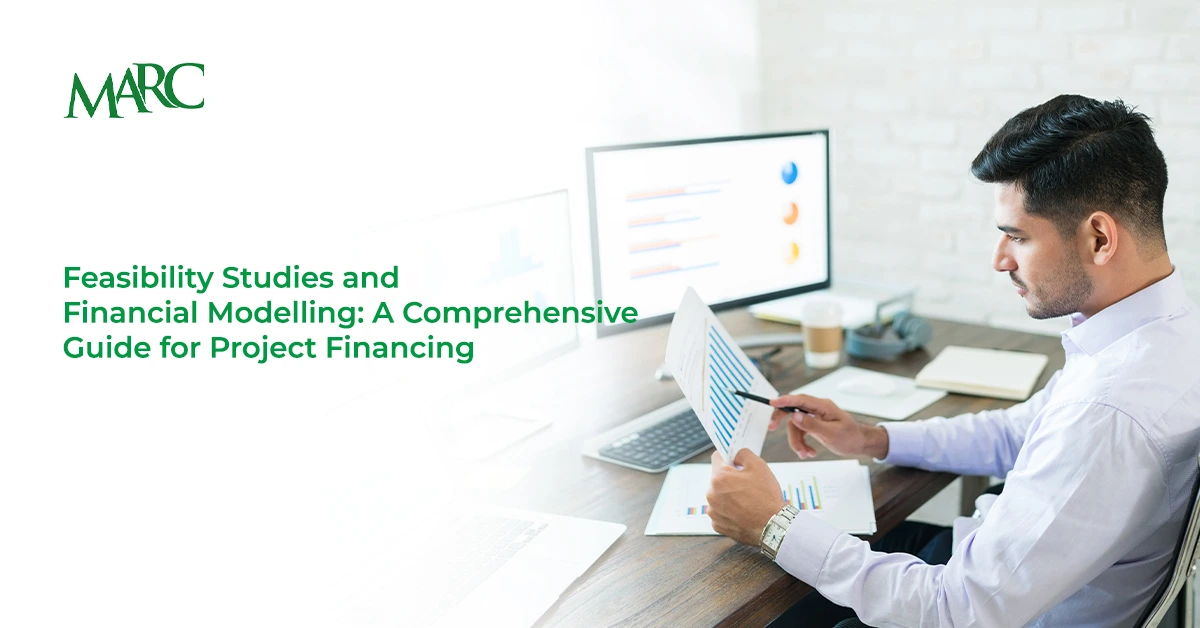
Imagine you have a groundbreaking project in mind—maybe a solar power plant or a new infrastructure venture. The initial idea looks promising, but a big question lingers: will it generate enough cash flow to cover debt and make a profit happen? In project financing, this question isn’t a minor detail, in fact, it’s the key to moving forward.
Lenders and investors won’t solely rely on an exciting pitch. They need solid evidence that your project is not only viable but also financially sound and resilient to risks. Without this, securing financing can feel like an impossible hurdle. This is where feasibility studies and financial modelling come into play.
Why Feasibility Studies and Financial Modelling are Essential for Project Financing?

A feasibility study gives a broader picture of the project’s potential, it examines whether the project is worth pursuing by analyzing market conditions, technical requirements, operational considerations, and regulatory aspects. Financial modelling then builds on these insights, giving a more specific picture of the project’s financial structure, from revenue forecasts to debt repayment. Together, they create a clear, realistic picture of how the project will perform financially.
Upon receiving reliable data from these two forms of research, you can gain a realistic picture of whether to pursue the project. If you decide to move forward, you can present evidence to support your pitch to investors during the project financing process.
Key Components of a Feasibility Study:
- Market Analysis: Evaluate the target market by analyzing demand, competition, and hindrances to identify potential opportunities.
- Technical Feasibility: Assess project requirements, including labour laws and legal compliance, to check if all the technical aspects align with regulations.
- Financial Viability: Estimate project costs and potential revenues to determine capital requirements and projected financial returns.
- Risk Assessment: Identify potential obstacles and develop mitigation strategies to address challenges and ensure the success of the project.
Gain an in-depth understanding of feasibility studies by reading this blog.
Key Elements of a Financial Modelling:
- Assumptions: Define key inputs such as market trends, cost estimates, and revenue forecasts to provide a foundation for the model.
- Revenue Projections: Estimate expected income based on the project’s output and market demand to assess the financial viability.
- Cost Structure: Outline the breakdown of capital and operational expenses to understand the financial commitments required for the project.
- Funding Structure: Identify the variety of loans, equity, and other sources of capital needed to finance the project effectively.
- Sensitivity Analysis: Evaluate the impact of changing variables on project outcomes to assess risks and enhance decision-making.
Everything MARC’s Financial Modelling Service Covers:
1. Budgeting and Management Forecasting
MARC assists you in creating accurate budgets and forecasts that align with your business goals. We guide you through planning future revenues and expenses, ensuring you’re prepared for every financial challenge and opportunity that you encounter. This planning is key in securing the financing you need to support your project.
2. Optimizing Cash Flow and Working Capital
Through our financial modelling strategies, we help you efficiently manage your cash flow and working capital and ensure you stay equipped with the right balance of liquid assets. We help you avoid unnecessary financial strain, and strengthen your project’s financing position.
3. Evaluating Corporate Deals
When it comes to corporate deals, MARC assesses the terms and impact, giving you a clear understanding of the financial benefits and risks. We provide insights into the long-term effects, ensuring that every deal aligns with your business objectives and financial plans, which is an important factor to consider when seeking funding for a project.
4. Analyzing Strategic Options
MARC helps you analyse different strategic options, weighing the potential outcomes and financial impacts. We assist you in choosing the path that provides the highest return and aligns with your long-term goals, ultimately, making your project attractive to the right investors and secure funding hassle-free.
5. Long-Term Strategic Planning
Our team works with you to develop a comprehensive strategic plan, forecasting your financial future. This proactive planning helps in anticipating challenges, seizing opportunities, and ensuring that your project remains financially viable.
6. Enhancing Appeal to Financial Partners
MARC’s financial modelling improves your financial positioning, making your business more attractive to investors, banks, and finance providers. We optimize your financials in such a way that you manage to secure better funding terms and ensure favourable conditions for growth, essential for successful project financing.
7. Assisting in Bank and Creditor Negotiations
Negotiations don’t have to be a hassle. MARC supports you in negotiations with creditors and banks, providing data-driven insights that strengthen your position. Our expertise helps you secure the best terms, ensuring your financial agreements are in your favour for facilitating smooth project financing.
The Feasibility Studies of MARC Provide the Following Value Propositions:
Besides the end-to-end assistance in financial modelling, we also provide feasibility studies that cater to businesses of all sizes, whether you’re a startup or a well-established conglomerate looking to assess the viability of your business or project.
1. Market Feasibility:
MARC analyses your target market to assess factors like competitors, estimated sales, market limitations, and growth potential. This gives you a clear picture of how well your business can perform in the market and where new opportunities lie.
2. Technical Feasibility:
We examine the technical side of your project, covering everything from labour laws and legal requirements to relevant regulations. Our team dedicates itself towards making your business meet all necessary standards and ensures it carries out plans smoothly within the regulatory framework.
3. Capital Requirements and Potential Financial Returns:
MARC helps you determine the capital you’ll need and estimate the returns you can expect. By analyzing the amount of funding required and future gains, we make sure you have the information needed to make smart financial decisions for your project’s success.
Are you looking to expand your business globally? Read this blog to learn how
Experience Hassle-Free Project Financing with MARC’s Guidance

With MARC, you can give your project the right funding it requires—whether it’s a solar energy plant, an infrastructure development, or any innovative venture you have in mind. By analyzing market conditions, technical requirements, and financial projections, we help you build a strong case for your project that resonates with lenders and investors alike.
Our expertise ensures that your feasibility studies are comprehensive and your financial models are robust. No matter the goals or scope of your venture, we are here to support you every step of the way.
Ready to take your project to heights? Explore our feasibility study and financial modelling services to see how we can help you succeed!
Project finance is a way to fund big, long-term infrastructure projects that usually involve both public and private sectors. It often follows the financial structure where repayment depends on the cash flow generated by the project and not the company’s performance.
A feasibility study, also known as a feasibility analysis or report, assesses whether a project plan is viable and likely to succeed. It evaluates the practicality of the proposed project to determine if the project can move forward.
Financial modelling involves creating a detailed spreadsheet summarizing a company’s expenses and earnings to project the financial impact of future events or decisions. This detailed financial analysis helps make informed decisions.
A feasibility study provides an evaluation of multiple aspects of a proposed project, including technical, economic, financial, legal, and environmental factors. This detailed assessment aids decision-makers in determining the project’s viability.
Project finance modelling is an Excel tool used to assess the risks and rewards of investing in or lending to long-term infrastructure projects. It helps understand the complex financial details involved in these investments.

